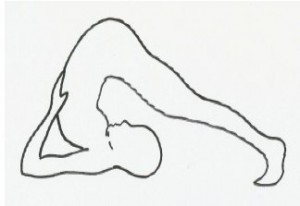
With more of us leading increasingly sedentary and stressful lifestyles, yoga is becoming a key ingredient in maintaining good health. This may be one reason behind the surging numbers of those practicing yoga regularly. But hidden behind these rising number of yoga practitioners is another number: the rising number of yoga related injuries.
Till now yoga has been considered as very safe and the relatively small numbers of yoga related injuries has borne this out. Unfortunately though there is an increasing trend towards “aggressive” forms of yoga with the corresponding increase in yoga related injuries. A recent article in NY times talks about yoga injuries, and though the article relies heavily on anecdotal stories and may sound alarmist at times, it does help bring up the discussion on yoga safety.
The fact is that as we age our joints are going to get stiff. As joints stiffen injuries will occur even in normal day-to-day activity. So the question before us is to undertake some form of physical exercise that increases our flexibility and reduce our risks from injuries in our daily activities. It is expected that any physical exercise itself will have with it some associated risk of injury. So the question becomes how do we do the exercise without injury. For yoga the question becomes: Can yoga be done safely? And for yoga teachers and students the question is: What can you do to minimize injuries?
Yoga teachers can considerably increase safety of the class by providing warnings where injuries are likely to take place and provide step-by-step instructions on how to safely get in and out of a pose. Limiting class size can also improve safety. In smaller classes yoga teachers can monitor students and see if they are following instructions or need special attention.
What can we do as a yoga student to avoid injuries? The first step is to understand that yoga is not a competitive sport. Neither is it a method to burn calories. There are tremendous health benefits from yoga. But these benefits will not be realized if we continue to bring inside the yoga class the same mind-set and attitude that we have outside. On the yoga mat it is just about our internal journey. We are not there to get to the next level of yoga or reach some weight goal we may have. The fact is that most of the yoga injuries are reported by yoga-teachers themselves striving for some sought after goal of attaining some advanced postures. As a yoga practitioner there is no need for that. All we have do is focus on the instruction, focus on the breathing, and do the postures without allowing our mind to wander or lose control of the breath. The magic of yoga unfolds on its own. There is no need to push ourself. These are ego-driven impulses that we want to get away from, at least when we are on the mat. We must also learn to accept the aging process and turn to gentler and easier forms of yoga styles as we age. Krishnamacharya himself changed the yoga style he taught based on the age and flexibility of his student. He also emphasized increasing use of Pranayama as we age.
The safest form of yoga is the yoga that incorporates breathing along with the movement in and out of postures. A good yoga teacher will make sure that the body is warmed up properly before difficult postures are attempted. A good teacher will prepare a sequence in which each postures prepares the ground for the following posture. The order in which the postures are done greatly increases the safety of each posture. An experienced teacher will always suggest variations for people who have difficulty in doing a posture. Never try to go into a posture by forcing yourself into it. Risk of injury is highest when you push yourself. Every posture should flow naturally, if not use the variation.
When we do yoga within our limits with a non-competitive attitude, we greatly limit the risk of injuries. At the same time all the benefits of yoga flow straight to us. Let us resolve to keep it that way!
You may also like: 9 Secrets Of Long Life
